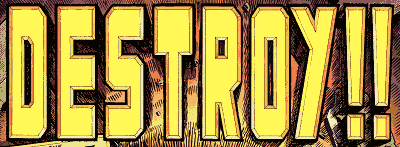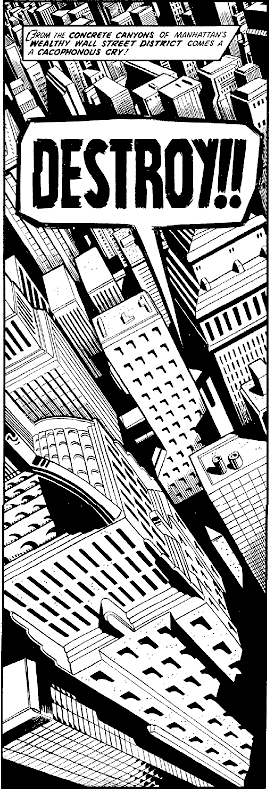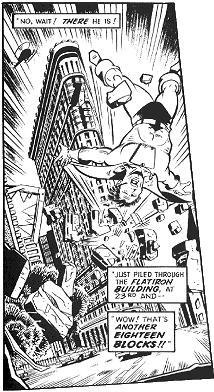DESTROY!!

 If you’re a serious student of comics, you’ve read the insightful analysis of Scott McCloud’s Understanding Comics. If you’re lucky, you’ve enjoyed the artful blend of whimsy and character development that was his beloved series Zot!. Readers of current DC books may have seen the highs and lows of his handling of the Man of Steel in Superman Adventures. And if you’re a true fan of McCloud, you eagerly await his upcoming Adventures of Abraham Lincoln (or whatever the title turns out to be). But you’ve missed out on the superlative McCloud comic book if you haven’t read DESTROY!!
If you’re a serious student of comics, you’ve read the insightful analysis of Scott McCloud’s Understanding Comics. If you’re lucky, you’ve enjoyed the artful blend of whimsy and character development that was his beloved series Zot!. Readers of current DC books may have seen the highs and lows of his handling of the Man of Steel in Superman Adventures. And if you’re a true fan of McCloud, you eagerly await his upcoming Adventures of Abraham Lincoln (or whatever the title turns out to be). But you’ve missed out on the superlative McCloud comic book if you haven’t read DESTROY!!
 DESTROY!! (which just doesn’t look right as a title unless I type it in all caps and bold… and the two exclamation points are part of the title) is the “story” of a huge, escalating fight between Captain Maximum and his former colleague the Red Basher, who has gone berserk (over a woman, of course). It was published in 1986, during the hiatus between Zot! #10 and #11. But don’t look for it in your local shop’s back-issue bins… because it wouldn’t fit. This comic book is 11 inches wide and 15 inches tall, the second-largest I know of (Chris Ware’s Acme Novelty Library #7 edges it out by a few inches in height).
DESTROY!! (which just doesn’t look right as a title unless I type it in all caps and bold… and the two exclamation points are part of the title) is the “story” of a huge, escalating fight between Captain Maximum and his former colleague the Red Basher, who has gone berserk (over a woman, of course). It was published in 1986, during the hiatus between Zot! #10 and #11. But don’t look for it in your local shop’s back-issue bins… because it wouldn’t fit. This comic book is 11 inches wide and 15 inches tall, the second-largest I know of (Chris Ware’s Acme Novelty Library #7 edges it out by a few inches in height).
While Ware uses the over-size format to explore intricate storytelling and layout techniques, McCloud uses the real estate in DESTROY!! for the sheer grandiosity of it all. The number of panels per page is no more than in most modern comics (and considerably fewer than was usual in 1986), with liberal use of full-size splash pages, individual panels the size of an ordinary comic book, and yes, one double-page 22″x15″ splash at the climax.
 I’ve heard DESTROY!! called “the first Image comic”, because of this liberal use of splash pages and the minimal use of characterisation or plot. But in many ways, it is the antithesis of the Image stereotype. The art is clean and simple, owing far more to Jack Kirby than to the folks whose wilder page layouts inspired the original, “hot” Image artitsts. Another difference is that the art is carefully researched, telling a story set in the real New York City. McCloud demonstrates this geeky attention to detail by plotting the fight on a map of Manhattan at the back of the book, identifying the real-world landmarks we see getting demolished along the way, as Captain Maximum attempts to subdue the rampaging Red Basher. Image founders Rob Liefeld and Todd McFarlane get trashed for ignoring basic anatomy; McCloud even sweats the details of architecture and geography. And besides, McCloud was doing it all for sheer, campy fun.
I’ve heard DESTROY!! called “the first Image comic”, because of this liberal use of splash pages and the minimal use of characterisation or plot. But in many ways, it is the antithesis of the Image stereotype. The art is clean and simple, owing far more to Jack Kirby than to the folks whose wilder page layouts inspired the original, “hot” Image artitsts. Another difference is that the art is carefully researched, telling a story set in the real New York City. McCloud demonstrates this geeky attention to detail by plotting the fight on a map of Manhattan at the back of the book, identifying the real-world landmarks we see getting demolished along the way, as Captain Maximum attempts to subdue the rampaging Red Basher. Image founders Rob Liefeld and Todd McFarlane get trashed for ignoring basic anatomy; McCloud even sweats the details of architecture and geography. And besides, McCloud was doing it all for sheer, campy fun.
 McCloud almost succeeds in providing what he set out to offer: pure, senseless violence. It’s a tongue-in-cheek satire of the superhero genre, and a soberingly prescient warning of things then yet-to-come. But at the same time, it’s a joyful celebration of the potential of the medium to satisfy the childish fascination with sheer power, and McCloud’s one last shot at a game he sees all superhero artists playing. As he puts it in the Author’s Note, “[they] are still playing King o’ The Hill with Jack Kirby. Just trying to do that one big explosion, that one powerhouse punch, that one bitchin’ close-up that’ll be bigger an’ badder than anything.. HE ever drew.” This simple goal is what makes DESTROY!! McCloud’s “superlative” creation: It’s the mostest he’s likely to ever try.
McCloud almost succeeds in providing what he set out to offer: pure, senseless violence. It’s a tongue-in-cheek satire of the superhero genre, and a soberingly prescient warning of things then yet-to-come. But at the same time, it’s a joyful celebration of the potential of the medium to satisfy the childish fascination with sheer power, and McCloud’s one last shot at a game he sees all superhero artists playing. As he puts it in the Author’s Note, “[they] are still playing King o’ The Hill with Jack Kirby. Just trying to do that one big explosion, that one powerhouse punch, that one bitchin’ close-up that’ll be bigger an’ badder than anything.. HE ever drew.” This simple goal is what makes DESTROY!! McCloud’s “superlative” creation: It’s the mostest he’s likely to ever try.
